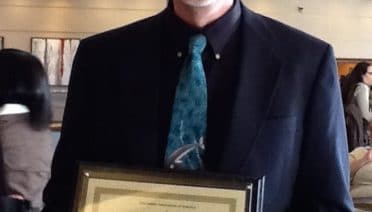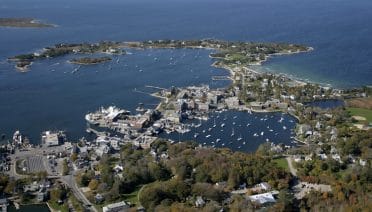Press Room
The Woods Hole Oceanographic Institution has appointed James Bellingham as the first director of its Center for Marine Robotics. Bellingham will come to WHOI in early fall 2014 from the Monterey Bay Aquarium Research Institute (MBARI), where he was director…
Mainly thought to be surface dwellers, Chilean devil rays (Mobula tarapacana) are most often seen gliding through shallow, warm waters. But a new study by scientists at Woods Hole Oceanographic Institution (WHOI) and international colleagues reveals that these large and majestic creatures are actually among the deepest-diving ocean animals.
An international team of scientists studying Emperor penguin populations across Antarctica finds the iconic animals in danger of dramatic declines by the end of the century due to climate change. Their study, published today in Nature Climate Change, finds the…
The Greenland Ice Sheet is a 1.7 million-square-kilometer, 2-mile thick layer of ice that covers Greenland. Its fate is inextricably linked to our global climate system. In the last 40 years, ice loss from the Greenland Ice Sheet increased four-fold…
The Antarctic Peninsula, the northern most region of Antarctica, is experiencing some of the most dramatic changes due to climate warming, including population declines of some penguin species. This is not the first time that region has felt the effects…
We know more about the surface of other planets than we do about Earth’s ocean. And what is known about our ocean would not have been possible without the deep-sea submersible Alvin, one of the hardest working, most reliable vehicles…
Phytoplankton—tiny, photosynthetic organisms—are essential to life on Earth, supplying us with roughly half the oxygen we breathe. Like all other life forms, phytoplankton require the element phosphorus to carry out critical cellular activity, but in some parts of the world’s…
Woods Hole Oceanographic Institution (WHOI) biologist Dr. Rebecca Gast and Falmouth (Mass.) High School art teacher Jane Baker have teamed up to bring the excitement of polar research to Falmouth art students. Gast met with Baker’s Art Two and Advanced…
The Population Association of America (PAA) selected biologist Hal Caswell of the Woods Hole Oceanographic Institution (WHOI) to receive the 2014 Mindel C. Sheps Award for his contributions to mathematical demography. The PAA is the major professional society devoted to the study of human populations. The prestigious honor is awarded to one scientist biennially on the basis of important contributions to knowledge either in the form of a single piece of work or a continuing record of high achievement.
The ocean is an increasingly industrialized space. Shipping, fishing, and recreational vessels, oil and gas exploration and other human activities all increase noise levels in the ocean and make it more difficult for marine mammals to hear and potentially diminish…
On Saturday, May 10, 2014, at 2 p.m. local time (10 pm Friday EDT), the hybrid remotely operated vehicle Nereus was confirmed lost at 9,990 meters (6.2 miles) depth in the Kermadec Trench northeast of New Zealand. The unmanned vehicle was working as part of a mission to explore the ocean’s hadal region from 6,000 to nearly 11,000 meters when a portion of it likely imploded.
Scientists from the Woods Hole Oceanographic Institution (WHOI) are kicking off an innovative NOAA-funded pilot program using robotic instruments and computer modeling analysis to shed light on changing ocean conditions in the Gulf of Maine as they relate to the harmful algal bloom (HAB) phenomenon commonly known as the New England red tide.
No place on the planet is more vulnerable to climate change than the polar regions of the Arctic and the Antarctic. Warming waters and the loss of sea ice are affecting the habitat and food source for many polar species…
Woods Hole Oceanographic Institution (WHOI) has received the highest rating for sound fiscal management, accountability, and transparency by Charity Navigator, the nation’s largest charity evaluator. WHOI has earned the highest 4-star rating for seven consecutive years, a distinction attained by…
An international team of researchers led by deep-sea biologist Tim Shank of the Woods Hole Oceanographic Institution (WHOI) will use the world’s only full-ocean depth, hybrid remotely operated vehicle, Nereus, and other advanced technology to explore life in the depths of the Kermadec Trench.
One of the greatest mysteries facing humans is how life originated on Earth. Scientists have determined approximately when life began (roughly 3.8 billion years ago), but there is still intense debate about exactly how life began. One possibility – that simple metabolic reactions emerged near ancient seafloor hot springs, enabling the leap from a non-living to a living world – has grown in popularity in the last two decades.
Recent research by geochemists Eoghan Reeves, Jeff Seewald, and Jill McDermott at Woods Hole Oceanographic Institution (WHOI) is the first to test a fundamental assumption of this ‘metabolism first’ hypothesis, and finds that it may not have been as easy as previously assumed. Instead, their findings could provide a focus for the search for life on other planets. The work is published in Proceedings of the National Academy of Science.
Scientists gave the rebuilt Alvin submarine two thumbs up after field-testing the nation’s only human-occupied deep-sea research vehicle for the first time after a major $42-million overhaul that dramatically upgraded the sub’s capabilities.
In a paper published in the open access journal PLOS ONE, researchers at Woods Hole Oceanographic Institution (WHOI) and colleagues identified a core skin bacterial community that humpback whales share across populations, which could point to a way to assess the overall health of these endangered marine mammals.
Under a National Oceanic and Atmospheric Administration program called Quantitative Ecology and Socioeconomics Training (QUEST), the new partnership will focus on teaching and advising in a graduate fisheries program and developing new technologies to improve assessment and management capabilities.
As towns across Cape Cod struggle with problems stemming from septic systems, a recent study by a Woods Hole Oceanographic Institution (WHOI) scientist focuses on one specific toxic by-product: mercury. In a study of local groundwater, biogeochemist Carl Lamborg found…


